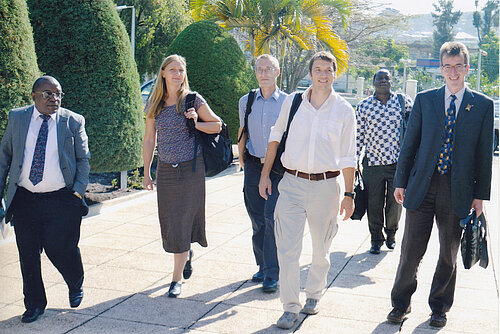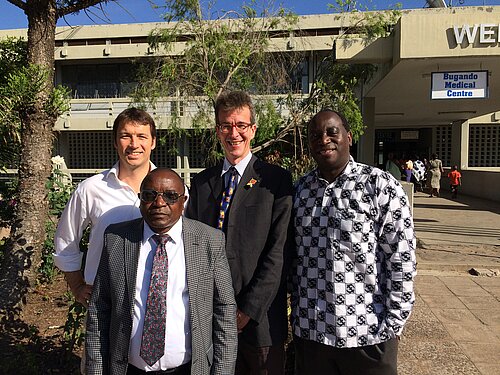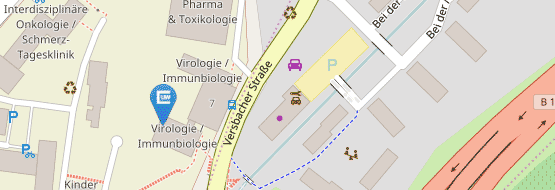Arbeitsgebiete
Research:
Triangular partnership to fight HIV/AIDS in Sub-Saharan Africa
The German Academic Exchange Service (DAAD) is funding a triangular partnership between the University of Würzburg (Germany), the University of Stellenbosch (South Africa) and the Catholic University in Mwanza (Tanzania) to support a long-lasting and close cooperation between these three Universities on research on HIV/AIDS in Sub-Saharan Africa.
From right to left: Prof. Samuel Kalluvya (Bugando Medical Center, Mwanza, Tanzania), Dr. Christa Kasang and OA Dr. Andreas Müller (Medical Mission Institute Würzburg, Germany), Prof. Carsten Scheller (University of Würzburg, Germany), Prof. Jean Nachega and Prof. Wolfgang Preiser (University of Stellenbosch, South Africa) at the 6th Scientific Graduation Symposium held in Mwanza, Tanzania, in November 2014.
HIV pathogenesis and chronic immune activation:
Untreated HIV infection is characterized by chronic, general immune activation that affects lymphocytes, monocytes and the inflammation cascade. There is a strong correlation of immune activation and HIV disease progression, suggesting that immune activation is a key factor in HIV pathogenesis. We examine immune activation in cART-treated and untreated HIV infection, and investigate the effect of corticosteroids to suppress this activation. In a randomized, placebo-controlled investigator-driven clinical trial (clinicaltrials.gov NCT01299948) we analyze the effects of prednisolone on immune activation and HIV disease progression. The principle investigators in this trial are Prof. Stich from the Medical Mission Institute Würzburg and Prof. Kalluvya from Bugando Medical Center, Tanzania.
HIV/AIDS in Sub-Saharan Africa:
The increasing access to combination antiretroviral therapy (cART) has led to a significant decline of AIDS cases in Sub-Saharan Africa (SSA). Despite this success, 1.1 million HIV patients in SSA were dying of AIDS in 2013, which is in striking contrast to the situation in high-resource countries, in which cART has turned HIV infection from a life-threatening disease into a manageable, chronic condition with an almost normal life expectancy.
We investigate the development of HIV drug-resistance and treatment adherence in different patient populations in South Africa and Tanzania. Our aim is to generate reliable epidemiological data about the spread of drug resistant HIV infections in SSA, and to identify correlates with enhanced risk of acquisition or development of drug-resistant HIV. In our aim to develop a vaccine against HIV, we also analyze the presence of neutralizing antibodies in patients infected with HIV.
Our studies are performed in close collaboration with the University Clinic Würzburg (Prof. Klinker), the Medical Mission Institute in Würzburg (Prof. Stich), the University of Stellenbosch in South Africa (Prof. Preiser) and the Catholic University of Health and Applied Sciences (CUHAS) in Tanzania (Prof. Kalluvya).
Partners in fight against HIV/AIDS: From right to left: Prof. Carsten Scheller (University of Würzburg, Germany), Prof. Samuel Kalluvya (Bugando Medical Center, Mwanza, Tanzania), Prof. Wolfgang Preiser and Prof. Jean Nachega (University of Stellenbosch, South Africa) at the Bugando Medical Center in Mwanza, Tanzania.
HIV-associated neurocognitive disorders (HAND):
HIV not only causes immunodeficiency but it can also trigger neurological disorders that manifest in difficulties in daily life to full-blown dementia. We examine the pathogenesis of HIV-associated neurocognitive disorders (HAND) and its viral and genetic correlates in HIV patients in Germany, South Africa and Tanzania.
Our studies are performed together with Prof. Koutsilieri (University of Würzburg, Germany) and in close collaboration with Prof. Arendt (University of Düsseldorf, Germany), Prof. Joska (University of Cape Town, South Africa), Prof. Stich (Medical Mission Institute Würzburg, Germany), and Prof. Kalluvya (Bugando Medical Center, Mwanza, Tanzania).




